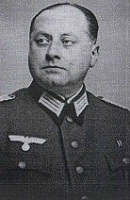Gottfried Benn
Gottfried Benn Poems
Take the forsythias deep within, each leaf,
and when the lilac blossoms on the lawn,
mix it, too, with your blood and joy and grief,
the dark soil that you depend upon.
...
Gottfried Benn Biography
Gottfried Benn was born at Mansfeld, Prussia, the son of a Lutheran minister. The poet's earliest influences were the stern discipline of his father, whom he grew to hate, and the gentle romanticism of his Swiss mother, whom he adored. Eldest son in a large family, he entertained his brothers and sisters with fairy tales of his own creation. Although interested in a literary career, he studied medicine and graduated with honors from the Kaiser Wilhelm Academy for Military Doctors. His mother's death from cancer prompted Benn, then 26, to compose his first major poetic effort, Morgue (1912) . This work emphasizes nature's indifference to human values and is characterized by melancholy cynicism. While serving as a medical officer during World War I, Benn composed semiautobiographical prose sketches which stressed the 'dissolution of natural vitality.' He then received an appointment to a hospital in Berlin and soon after married Edith Brosin, an actress. After beginning a private practice among the poor of Berlin, Benn published Flesh (1917) , his second volume of poetry. In this work his disgust with 'the stench of life' is evident. Despite personal difficulties, among them his wife's death in 1921, Benn continued to pursue his literary and medical careers. Collections of his poetry were published in 1922,1928, and 1935. For a brief period he was attracted to Nazism, since he felt that the political theories of this movement would foster a new social order based on the philosophy of Friedrich Nietzsche. Considered reactionary, in 1932 Benn was removed from the faculty of the Prussian Academy by more liberal colleagues. But ironically, Hitler's regime was also hostile toward him. His prose works After Nihilism (1932) and The New State and the Intellectual (1933) supported the Third Reich but were banned because his poetry had been published by Jewish-owned firms. In 1935 Benn joined the army medical corps and served throughout World War II. Benn was prevented from publishing by the Nazi government, but he privately printed a group of 22 poems in 1943. His second wife died in 1945, and he shortly thereafter married again. After the end of the war his work was banned by the Allies, but with the publication of Static Poems in 1948, he reemerged as a major poet. In 1949 he published several novellas, including The Ptolemean. Nihilistic thought continued to permeate Benn's work, but in Static Poems and Intoxicated Tide (1949) he grants that a precarious happiness may occur when man transcends biological and intellectual decomposition through art. Benn's autobiography, Doppelleben (Double Life) , appeared in 1950. He died in West Berlin in 1956.)
The Best Poem Of Gottfried Benn
Last Spring
Take the forsythias deep within, each leaf,
and when the lilac blossoms on the lawn,
mix it, too, with your blood and joy and grief,
the dark soil that you depend upon.
Sluggish days. All have been gotten through.
And if you do not ask: the start or close,
then perhaps the hours will carry you
as distantly as June's unfolding rose.
- translated from the German by Leo Yankevich
first appeared in 'Trinacria'
